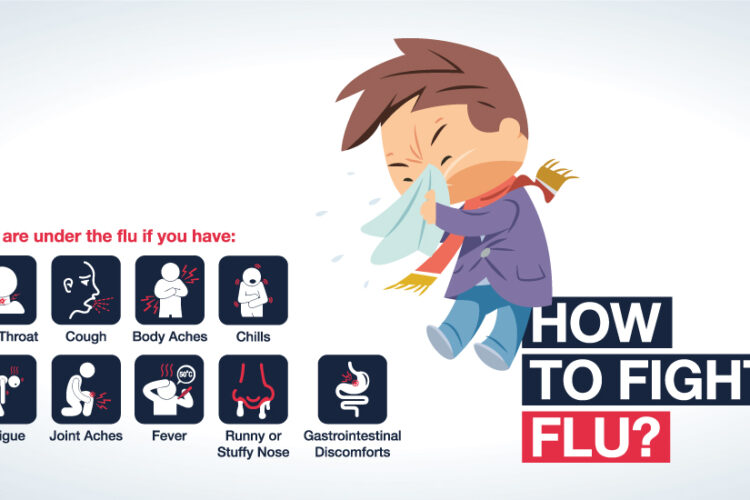Influenzae

What Is Influenzae or Flu and How Is It Caused?
Influenzae, or flu, is a contagious respiratory disease caused by a virus. When someone who has flu sneezes or coughs, the flu virus is expelled into the air where it may be inhaled by someone nearby. Flu viruses may also be transmitted by direct hand contact.
What Happens When you get the FLU?
When flu strikes, the lining of your respiratory system becomes swollen and inflamed. Coughing, sneezing, and tightness in the chest usually occur. The whole body is affected. Fever, chills, weakness, loss of appetite and aching of the head and muscles are frequent symptoms. The onset of fever is quick, but it usually subsides after a few days. Fatigue may linger after the other symptoms have passed.
Is Influenzae or FLU Considered Dangerous?
For healthy people, Influenzae is not considered too serious. For older or chronically ill people, though, flu can be very serious or fatal. Bacterial infections-usually pneumonia-are common complications in such people.
Other less common complications are viral pneumonia, encephalitis, kidney failure and various nervous Disorders.
Patients with chronic lung disease, heart disease, chronic kidney or metabolic disorders, or people with a disease or on therapy which depresses the immune system are especially vulnerable to serious complications of flu. However, anyone who notices unusual or persistent symptoms should alert his or doctor. Influenzas and pneumonia are still the fifth leading cause of death in the United States.
How is FLU Prevented?
Vaccines are developed each year to match the type of flu virus which is expected to strike. These vaccines are about 75% effective in preventing flu.
People used to worry about the reaction to the vaccine, but today only about one person in four might have a tenderness at the site of the shot, and only a very small percent will develop slight fever, chills or headache for a day or two. In a few people, an allergic reaction has been seen, probably due to the egg protein in which the vaccine was prepared. For that reason, people with an allergic history should consult their doctor before taking the vaccine.
Who should be Vaccinated?
People at high risk should be vaccinated yearly unless their doctor advises against it. Others should consult their doctor to see whether it is necessary.
How are flu & its complications treated?
For uncomplicated flu, your doctor will probably tell you to stay in bed as long as the acute symptoms persist-perhaps for two or three days after the fever is gone. In high risk patients, a drug called oseltamivir is useful for treating the flu. There may be mild side effects from the drug. Bacterial complications of flu may be treated with antibiotics. In fact, people with chronic lung disease are often given antibiotics the moment flu is diagnosed. Non-bacterial complications require various forms of treatment, depending on the problem. All complications of flu should be considered serious and treated by a doctor.
Key Points to Remember
- If you are a high-risk person. you should get a yearly flu shot.
- You should know about treating flu in case it occurs despite your vaccination.
- The appropriate timing of the annual flu shot is usually in the month of April/May each year when the new batch of vaccines come into the market.
- Discuss this with your doctor.
